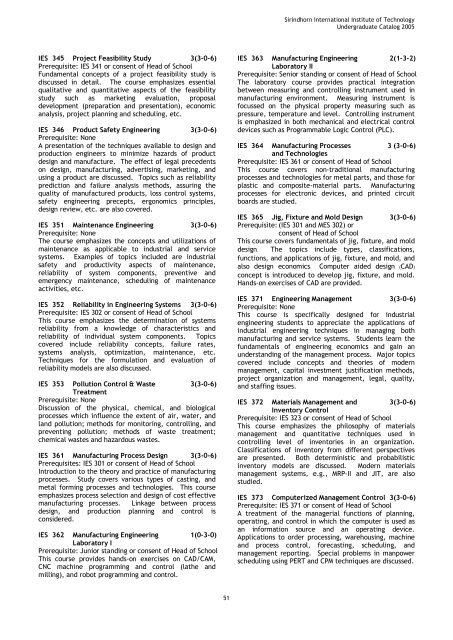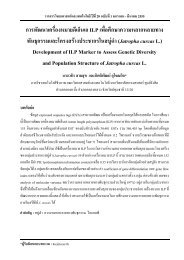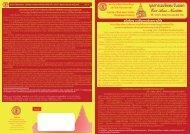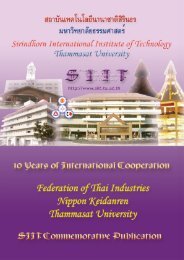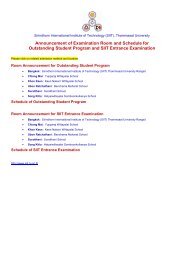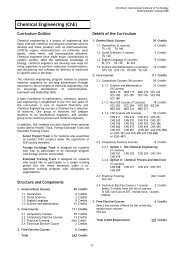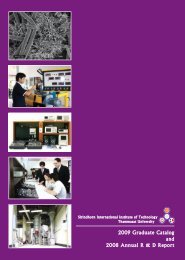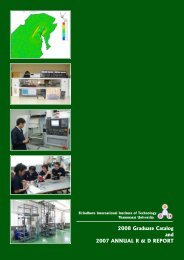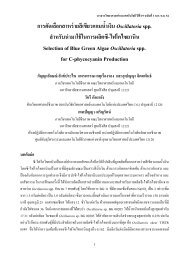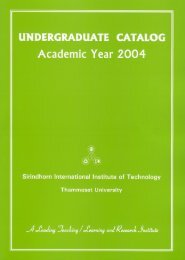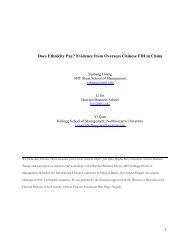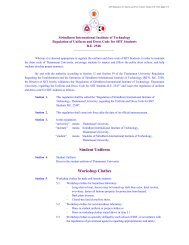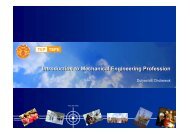Course Description - Sirindhorn International Institute of Technology
Course Description - Sirindhorn International Institute of Technology
Course Description - Sirindhorn International Institute of Technology
You also want an ePaper? Increase the reach of your titles
YUMPU automatically turns print PDFs into web optimized ePapers that Google loves.
<strong>Sirindhorn</strong> <strong>International</strong> <strong>Institute</strong> <strong>of</strong> <strong>Technology</strong><br />
Undergraduate Catalog 2005<br />
IES 345 Project Feasibility Study 3(3‐0‐6)<br />
Prerequisite: IES 341 or consent <strong>of</strong> Head <strong>of</strong> School<br />
Fundamental concepts <strong>of</strong> a project feasibility study is<br />
discussed in detail. The course emphasizes essential<br />
qualitative and quantitative aspects <strong>of</strong> the feasibility<br />
study such as marketing evaluation, proposal<br />
development (preparation and presentation), economic<br />
analysis, project planning and scheduling, etc.<br />
IES 346 Product Safety Engineering 3(3‐0‐6)<br />
Prerequisite: None<br />
A presentation <strong>of</strong> the techniques available to design and<br />
production engineers to minimize hazards <strong>of</strong> product<br />
design and manufacture. The effect <strong>of</strong> legal precedents<br />
on design, manufacturing, advertising, marketing, and<br />
using a product are discussed. Topics such as reliability<br />
prediction and failure analysis methods, assuring the<br />
quality <strong>of</strong> manufactured products, loss control systems,<br />
safety engineering precepts, ergonomics principles,<br />
design review, etc. are also covered.<br />
IES 351 Maintenance Engineering 3(3‐0‐6)<br />
Prerequisite: None<br />
The course emphasizes the concepts and utilizations <strong>of</strong><br />
maintenance as applicable to industrial and service<br />
systems. Examples <strong>of</strong> topics included are industrial<br />
safety and productivity aspects <strong>of</strong> maintenance,<br />
reliability <strong>of</strong> system components, preventive and<br />
emergency maintenance, scheduling <strong>of</strong> maintenance<br />
activities, etc.<br />
IES 352 Reliability in Engineering Systems 3(3‐0‐6)<br />
Prerequisite: IES 302 or consent <strong>of</strong> Head <strong>of</strong> School<br />
This course emphasizes the determination <strong>of</strong> systems<br />
reliability from a knowledge <strong>of</strong> characteristics and<br />
reliability <strong>of</strong> individual system components. Topics<br />
covered include reliability concepts, failure rates,<br />
systems analysis, optimization, maintenance, etc.<br />
Techniques for the formulation and evaluation <strong>of</strong><br />
reliability models are also discussed.<br />
IES 353 Pollution Control & Waste 3(3‐0‐6)<br />
Treatment<br />
Prerequisite: None<br />
Discussion <strong>of</strong> the physical, chemical, and biological<br />
processes which influence the extent <strong>of</strong> air, water, and<br />
land pollution; methods for monitoring, controlling, and<br />
preventing pollution; methods <strong>of</strong> waste treatment;<br />
chemical wastes and hazardous wastes.<br />
IES 361 Manufacturing Process Design 3(3‐0‐6)<br />
Prerequisites: IES 301 or consent <strong>of</strong> Head <strong>of</strong> School<br />
Introduction to the theory and practice <strong>of</strong> manufacturing<br />
processes. Study covers various types <strong>of</strong> casting, and<br />
metal forming processes and technologies. This course<br />
emphasizes process selection and design <strong>of</strong> cost effective<br />
manufacturing processes. Linkage between process<br />
design, and production planning and control is<br />
considered.<br />
IES 362 Manufacturing Engineering 1(0‐3‐0)<br />
Laboratory I<br />
Prerequisite: Junior standing or consent <strong>of</strong> Head <strong>of</strong> School<br />
This course provides hands‐on exercises on CAD/CAM,<br />
CNC machine programming and control (lathe and<br />
milling), and robot programming and control.<br />
IES 363 Manufacturing Engineering 2(1‐3‐2)<br />
Laboratory II<br />
Prerequisite: Senior standing or consent <strong>of</strong> Head <strong>of</strong> School<br />
The laboratory course provides practical integration<br />
between measuring and controlling instrument used in<br />
manufacturing environment. Measuring instrument is<br />
focussed on the physical property measuring such as<br />
pressure, temperature and level. Controlling instrument<br />
is emphasized in both mechanical and electrical control<br />
devices such as Programmable Logic Control (PLC).<br />
IES 364 Manufacturing Processes 3 (3‐0‐6)<br />
and Technologies<br />
Prerequisite: IES 361 or consent <strong>of</strong> Head <strong>of</strong> School<br />
This course covers non‐traditional manufacturing<br />
processes and technologies for metal parts, and those for<br />
plastic and composite‐material parts. Manufacturing<br />
processes for electronic devices, and printed circuit<br />
boards are studied.<br />
IES 365 Jig, Fixture and Mold Design 3(3‐0‐6)<br />
Prerequisite: (IES 301 and MES 302) or<br />
consent <strong>of</strong> Head <strong>of</strong> School<br />
This course covers fundamentals <strong>of</strong> jig, fixture, and mold<br />
design. The topics include types, classifications,<br />
functions, and applications <strong>of</strong> jig, fixture, and mold, and<br />
also design economics. Computer aided design (CAD)<br />
concept is introduced to develop jig, fixture, and mold.<br />
Hands‐on exercises <strong>of</strong> CAD are provided.<br />
IES 371 Engineering Management 3(3‐0‐6)<br />
Prerequisite: None<br />
This course is specifically designed for industrial<br />
engineering students to appreciate the applications <strong>of</strong><br />
industrial engineering techniques in managing both<br />
manufacturing and service systems. Students learn the<br />
fundamentals <strong>of</strong> engineering economics and gain an<br />
understanding <strong>of</strong> the management process. Major topics<br />
covered include concepts and theories <strong>of</strong> modern<br />
management, capital investment justification methods,<br />
project organization and management, legal, quality,<br />
and staffing issues.<br />
IES 372 Materials Management and 3(3‐0‐6)<br />
Inventory Control<br />
Prerequisite: IES 323 or consent <strong>of</strong> Head <strong>of</strong> School<br />
This course emphasizes the philosophy <strong>of</strong> materials<br />
management and quantitative techniques used in<br />
controlling level <strong>of</strong> inventories in an organization.<br />
Classifications <strong>of</strong> inventory from different perspectives<br />
are presented. Both deterministic and probabilistic<br />
inventory models are discussed. Modern materials<br />
management systems, e.g., MRP‐II and JIT, are also<br />
studied.<br />
IES 373 Computerized Management Control 3(3‐0‐6)<br />
Prerequisite: IES 371 or consent <strong>of</strong> Head <strong>of</strong> School<br />
A treatment <strong>of</strong> the managerial functions <strong>of</strong> planning,<br />
operating, and control in which the computer is used as<br />
an information source and an operating device.<br />
Applications to order processing, warehousing, machine<br />
and process control, forecasting, scheduling, and<br />
management reporting. Special problems in manpower<br />
scheduling using PERT and CPM techniques are discussed.<br />
51


